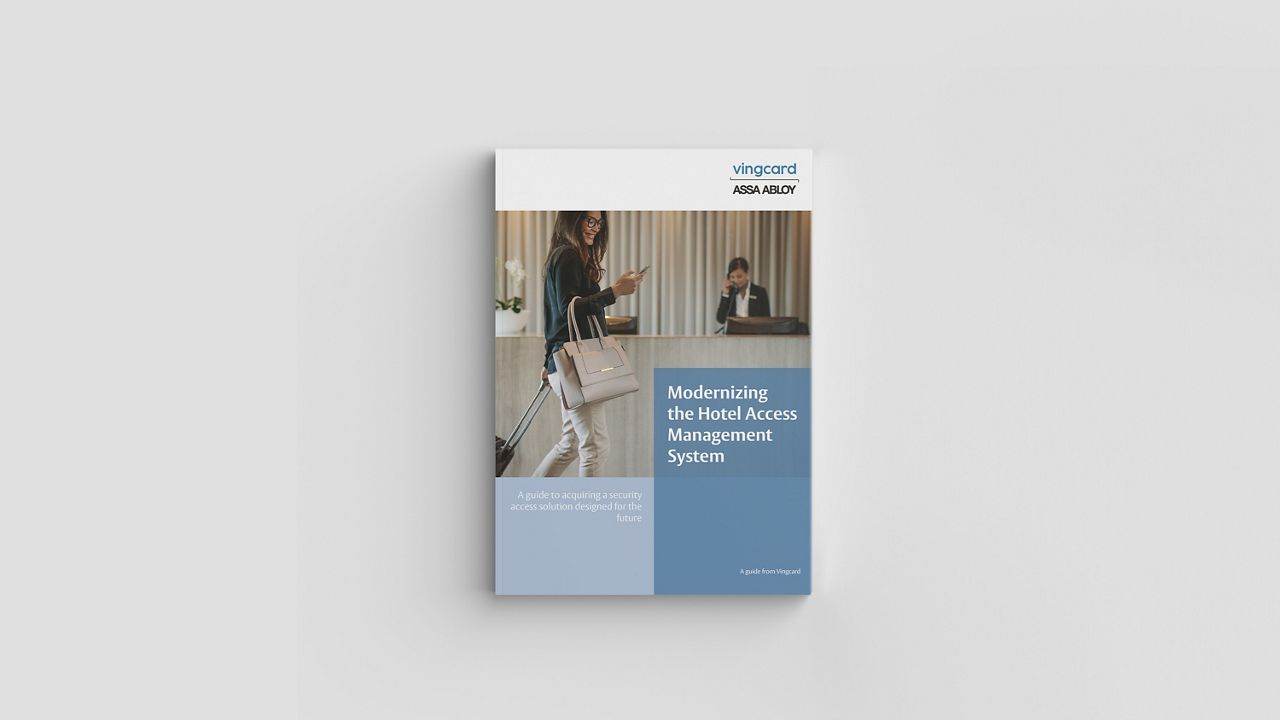
Make Leaner Operations Work for Your Hotel Staff, Guests & Bottom Line


Entering a hotel today offers an unmistakable contrast to what was once business as usual. Now a guest’s first onsite interaction involves the scanning of temperatures and the welcoming smile of a front desk receptionist has been replaced with face masks and a flurry of questions to determine if a guest might have been exposed to germs. Other hotel employees now hover in the background waiting to hurriedly sanitize surfaces before the arrival of the next guest. Such now widespread routines represent just a fraction of the new tasks that hotel employees must carry out on top of more traditional responsibilities that come with operating any successful hospitality business.
Yet the industry’s ongoing decline in occupancy rates, with some analysts projecting a 29 percent drop over the next six months, means that hoteliers are left with no option but to operate with a significantly reduced workforce. Those staff members that remain must not only juggle enhanced cleanliness assignments, but must also pick up the slack from no longer present colleagues while still making sure that their own original responsibilities are adequately handled.
Under any market environment, fewer employees burdened with more tasks can easily translate into a recipe for costly mistakes and missed revenue opportunities. During a pandemic, such situations can also place the strict following of cleanliness protocols at risk, resulting in potentially increased liability for hoteliers. However, from front desk services to backend operations, advances in technology are providing hotel leadership and employees with the means to do much more with even less. In this blog post, we take a look at the latest innovations that should be in any hotelier’s toolset as they attempt to steer their business back towards efficiency, profitability and maximum guest satisfaction.
Free guide: Modernizing the Hotel Access Management System
A New Industry Challenge Requires a New Kind of PMS
As the core system of any hotel, the available functionalities and flexibility of a PMS can make or break a property’s efficiency and most importantly, the ability to cater to guest needs. Faced with the need to run leaner, more efficient operations while still striving to increase occupancy and provide exceptional service to current guests, today’s hospitality professionals require a next-generation PMS solution that can seamlessly adjust and thrive in the new hotel environment.
One of the most crucial needs that a next-gen PMS can address is the now routine requirement for employees to be increasingly mobile as they traverse a property to carry out multiple tasks at once. Cloud-based PMS technologies are proving to be ideal for such situations as platforms that are accessible via web browser and virtually any device with an online connection. No longer tied to a stationary terminal, hotel employees regardless of their physical location can instantly interact with and update system information to ensure that all operations continue to flow seamlessly and that guests always receive swift service.
Cloud PMS solutions can also aid hoteliers with considerably cutting down operational expenses. As a fully web-based platform, the technology completely eliminates the need for costly onsite servers that additionally take up valuable onsite space which could be used for other purposes. Yet on top of these significant advantages, advanced cloud PMS solutions can also prove vital to a hotel’s ability to adopt other services and functionalities that are now central to a safe, efficient and profitable business. For example and in contrast to legacy platforms, a next-gen PMS offers seamless integration abilities for mobile-based services which are now sought out by 60 percent of guests seeking to reduce germ exposure risks. Such systems can also eliminate data silos between PMS, CRM and RMS platforms- ensuring that hotel staff always have ready access to accurate information and providing them the ability to swiftly move back and forth between functions such as inputting or canceling reservations, updating pricing models or managing inventory.
Make Life Easier for Your Front Line Employees
Although a next-generation PMS can go a long way in alleviating the increased burdens facing employees while boosting overall operational efficiency, several other new technologies should also be at the front of hotelier minds that can lead to less reliance on manual labor. For front desk staff, one common pain point that has grown alongside the pandemic is the processing of payments while still catering to other guest needs. Such routine tasks involving a straightforward transaction with little to no value towards guest experiences should be handled automatically, freeing up precious employee time to focus on other areas that actually make an impact. Thanks to the prevalence of personal smart devices, hoteliers now have the option of moving payment processes entirely online. With the simple emailing of a private link to a payment portal or via a hotel’s app, hoteliers can simultaneously remove a time-consuming responsibility from the hands of employees while increasing guest convenience and enhancing social distancing efforts.
Another solution offering multiple advantages and that has experienced skyrocketing adoption rates is mobile key functionality. While the main push to adopt digital key has come from the platform’s ability to minimize close contact with others and with surfaces, the technology presents yet another opportunity to reduce the strain on front line employee attention spans. Guests using their mobile devices to self-check-in and automatically receive a digital key means hotel staff can again avoid the need to use up time on routine tasks. This also extends to the frequent issue of replacing lost keys as each key is always stored on a guest’s device.
Mobile key solutions should also be paired with an advanced access management system that can further streamline guest-facing operations. This includes being able to instantly extend guest stays or issue guestroom re-assignments without requiring a time-consuming front desk visit for both guests and employees alike. As with PMS solutions, newer cloud-based access management systems are now available that also provide the full benefits of a web-based solution. These include being able to remotely monitor and manage security access operations without first having to locate a terminal. Armed with their personal device, employees can instantly switch their focus to an arising security issue or entry-related guest request regardless of physical location; resulting in faster response times, enhanced security and no doubt appreciative employees. For the cost-conscientious hotelier, a cloud-based access management system again also translates into reduced expenses with the removal of onsite servers and with maintenance or software updates handled entirely off-premise by a solution’s provider.
Ensuring Maximum Efficiency Behind the Scenes
Any hospitality professional knows that the vast majority of employee tasks and responsibilities that come with the daily running of a hotel business take place away from guest eyes. Logistics such as keeping track of vendors, ordering inventory replenishment or checking the conditions of equipment are all vital components to meeting hotel and guest needs, but can represent a tremendous drain on limited employee time if carried out inefficiently.
By making use of advances in location-based technologies that leverage the presence of beacons to pinpoint the precise location of both individuals and inventory stock, hoteliers and their staff can receive some much needed support while achieving a level of efficiency far beyond what was once possible. A comprehensive location solution can for instance, track the real-time location of a multitude of assets- from room service trays and TV sets to bulk F&B inventory items or spare equipment parts. This not only saves employees from scurrying to find the whereabouts of a needed item but also ensures that amenities are always readily available upon guest request.
The same location network can also be used to monitor onsite vendors, ensuring that any time logs are accurate while increasing the likelihood of speedier service without the need for staff to perform routine check-ups. On top of these benefits, a location solution can even constantly monitor the condition of motorized equipment such as elevators or refrigerators- eliminating yet another time-consuming task while safeguarding hotels from costly maintenance repairs.
With hotels spending an average of $2,196 on energy costs per guestroom a year, it is unsurprising that many managers will also direct their employees to go room-to-room to turn off lights and appliances when a room is unoccupied. This again represents another instance of inefficiency, both in terms of labor resources and in lowering expenses that can be solved by modern technology. By integrating smart solutions such as thermostats and lighting with a hotel’s PMS and access management system, each guestroom can instead automatically determine current occupancy status and adjust in-room settings accordingly with zero involvement on the part of staff. At the same time, arriving hotel guests can always be guaranteed a welcoming and comfortable guestroom environment while saving hoteliers thousands of dollars in revenue each year.
The Future is Automated
A common aspect for each of the technology solutions discussed is that they replace traditionally manual processes with full automation and sidestep the need for human intervention. While some may believe that these functionalities may limit interactions between guests and staff, the real benefit is that they actually allow your staff to regain the time they need to engage in worthwhile conversations that result in better experiences for your guests. By automating many of the daily routine chores that can easily overwhelm an employee’s schedule, hotels can also avoid unnecessary errors from staff burnout while creating a business environment that is safe, efficient and that always offers an enjoyable experience for both guests and employees alike.
Subscribe to our Newsletter
Fill out the form below to subscribe to our newsletter. By doing so, you'll not only be the first to discover what's next on our blog but also join a community passionate about the innovation and tradition driving the hospitality realm forward.
